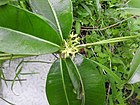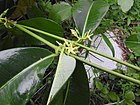Note: This is a project under development. The articles on this wiki are just being initiated and broadly incomplete. You can Help creating new pages.
Cryptolepis buchanani
Cryptolepis buchanani is much branched, Large climbing shrub. Purplish red when young peeling off in papery flakes and It will become brown when old.
Contents
[hide]- 1 Uses
- 2 Parts Used
- 3 Chemical Composition
- 4 Common names
- 5 Properties
- 6 Habit
- 7 Identification
- 8 List of Ayurvedic medicine in which the herb is used
- 9 Where to get the saplings
- 10 Mode of Propagation
- 11 How to plant/cultivate
- 12 Commonly seen growing in areas
- 13 Photo Gallery
- 14 References
- 15 External Links
Uses
Appetitis, Fever, Skin diseases, Leprosy, Rickets[1]
Parts Used
Chemical Composition
Common names
| Language | Common name |
|---|---|
| Kannada | Medhagulihambu |
| Hindi | Karanta |
| Malayalam | Kattupalvalli |
| Tamil | Paalkodi |
| Telugu | Adavipaalatige |
| Marathi | |
| Gujarathi | |
| Punjabi | |
| Kashmiri | |
| Sanskrit | Krishna sariva |
| English | Indian Sarsaparilla |
Properties
Reference: Dravya - Substance, Rasa - Taste, Guna - Qualities, Veerya - Potency, Vipaka - Post-digesion effect, Karma - Pharmacological activity, Prabhava - Therepeutics.
Dravya
Rasa
Guna
Veerya
Vipaka
Karma
Prabhava
Habit
[[:Category:Habit - |]]
Identification
Leaf
| Kind | Shape | Feature |
|---|---|---|
| Elliptic, Oblong or oblong – Lanceolate | Acute or Acuminate | Leaves are 7.5 – 12.5 cm X 3.8 – 6.3 cm in size, green above and whitish beneath |
Flower
| Type | Size | Color and composition | Stamen | More information |
|---|---|---|---|---|
| Ovate-lanceolate with scarious margins | Greenish yellow or Yellow white | Flowering season is December to May |
Fruit
| Type | Size | Mass | Appearance | Seeds | More information |
|---|---|---|---|---|---|
| Follicle | 2.5-10 cm long | Seeds are 0.5 cm long in size, ovate-oblong, compressed and black in colour | Fruiting season is December to May |
Other features
List of Ayurvedic medicine in which the herb is used
Where to get the saplings
Mode of Propagation
How to plant/cultivate
The crop prefers well-drained sandy-loam acidic soils with abundant organic matter (4.5 to 6.0).[5]
Commonly seen growing in areas
[[:Category:Herbs that are commonly seen in the region of |]], [[:Category:Herbs that are commonly seen in the region of |]], [[:Category:Herbs that are commonly seen in the region of |]], [[:Category:Herbs that are commonly seen in the region of |]], [[:Category:Herbs that are commonly seen in the region of |]].
Photo Gallery
References
- Jump up ↑ Karnataka Medicinal Plants Volume - 2 by Dr.M. R. Gurudeva, Page No. 587
- ↑ Jump up to: 2.0 2.1 "Karnataka Medicinal Plants Volume - 2" by Dr.M. R. Gurudeva, Page No.590, Published by Divyachandra Prakashana, #45, Paapannana Tota, 1st Main road, Basaveshwara Nagara, Bengaluru.
- Jump up ↑ [Chemistry]
- Jump up ↑ Kappatagudda - A Repertoire of Medicianal Plants of Gadag by Yashpal Kshirasagar and Sonal Vrishni, Page No. 146
- Jump up ↑ Cultivation
External Links
- Ayurvedic Herbs known to be helpful to treat Appetitis
- Ayurvedic Herbs known to be helpful to treat Fever
- Ayurvedic Herbs known to be helpful to treat Skin diseases
- Ayurvedic Herbs known to be helpful to treat Leprosy
- Ayurvedic Herbs known to be helpful to treat Rickets
- Herbs with Roots used in medicine
- Herbs with Stem used in medicine
- Herbs with common name in Kannada
- Herbs with common name in Hindi
- Herbs with common name in Malayalam
- Herbs with common name in Tamil
- Herbs with common name in Telugu
- Herbs with common name in Sanskrit
- Herbs with common name in English
- Habit -
- Index of Plants which can be propagated by Seeds
- Herbs that are commonly seen in the region of
- Herbs
- Pages without herbs images


